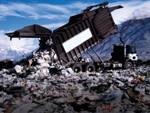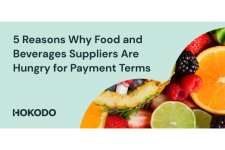Reprieve for landfill

The news that both government and the European Commission (EC) had agreed to rethink their position over next January's expected ban on the landfilling of many former foodstuffs was greeted with relief in the food industry. But although it undoubtedly means easier (and cheaper) waste management for many -- at least in the short term -- uncertainties still remain. And those industries which had worked out an alternative future for their wastes would be well advised not to send those files off to landfill just yet.
The Department for Environment Food and Rural Affairs' (DEFRA's) announcement on June 6 that it had secured the EC's agreement to "flexibility", allowing member states leeway in deciding which former foodstuffs can be regarded as pre-treated and so landfillable took everyone by surprise -- not least those waste contractors that had invested millions in new plant which now has little immediate market.
Until then, the European Union (EU) Animal By-products Regulation 1774/2002 was being interpreted strictly. It prohibits landfill of animal by-products including carcass material and food from manufacturing and retail outlets, and reclassified some material as animal by-products.
Landfill of raw fish and meat were and will remain banned but the EU Regulation had a 'Category 3' covering the lowest risk wastes which included 'catering waste' and the UK secured a transitional measure until January 1 2006 allowing 'former foodstuffs' to be treated as catering waste and so be sent to landfill. Former foodstuffs covered a range of material including meat off-cuts from delicatessens, pies, bread, cakes and pasta, dairy products, ready meals, tinned or bottled foods.
DEFRA's sudden change of heart in June followed the EC's acceptance of wider flexibility, although exactly why is unclear. The proposals are still subject to consultation, however, and exactly what form they will eventually take is still uncertain. Nevertheless, the food industry responded positively.
"It's looking very good but it depends on agreement at the European level," says Chilled Food Association secretary general Kaarin Goodburn. "We hope it's sooner rather than later. There's no reason why food that's ready to eat should be treated as high level waste."
Ready meals with their complex mix of foodstuffs and packaging are an obvious challenge for waste management, but exactly what will and won't escape the landfill ban is not wholly certain. Many people in the industry think the 2004 exemption -- treating former foodstuffs as catering waste -- will simply continue, but this isn't necessarily the case.
As long ago as 2002 when the EU Regulation was drawn up, the EC hinted it might exempt bakery products which used only small quantities of animal by-products, including pasta and confectionery. This seems still to be its intention and it is also being flexible on the freedom member states will have to decide which 'treated' former foodstuffs are hazardous and which are not. DEFRA is believed to be planning to set up a working party with the industry and will issue a list of former foodstuffs it considers hazardous. A lot will depend on what counts as treatment.
The news sent shockwaves through the waste industry which is investing heavily in new technologies to replace landfill, with some plants actually up and running in areas like compost, waste-to-energy and anaerobic digestion.
"It does look like a dreadful contradiction," says Composting Association technical officer Mary Messer. "For composters and anaerobic digestors that had geared up in anticipation, a lot of feedstocks have just disappeared."
Pressure to divert
Pressure to divert wastes from landfill isn't going to go away, however. The Landfill Directive requires huge diversion of biodegradable waste to other options progressively between now and 2020 and the government has introduced tradable permits for waste disposal authorities to facilitate this. The landfill tax escalator will continue to rise too, ending the days of cheap landfill.
Some wastes will continue to require rendering or incineration of course, although availability of both technologies continues to be hampered by the knock on effects of environmental non-governmental organisations' campaigns against waste-to-energy.
Although such plants actually have some of the lowest emissions around, applications for planning consent face years of struggle against local complaints they will threaten everyone's health. The opposition has now spread to all waste facilities, even ones popular with environmentalists like composting.
A bewildering range of plants is under development, with mechanical-biological treatment, incineration, composting (with high residence times), anaerobic digestion and biogas of particular interest to the food industry.
Food waste is, for the most part, a potential non-fossil fuel source and a number of the technologies seek to harness its energy content. The Inetec system, for instance, uses a thermo-mechanical drying process to reduce the waste to a dry organic powder which can then be burned to generate hot water, steam or electricity. Meanwhile the Rhino R500 system from Bioflame is a biomass burner.
Such plant has hitherto been mainly converted wood chip burners, but the new system is designed to handle a range of wastes which are either dried or shredded and fed into the burner, again producing hot water, steam or power.
Whatever regulatory regime eventually emerges for food wastes, the industry also generates other kinds of waste and there are challenges aplenty ahead here too. The packaging waste challenge remains and the requirements of the regulations get tighter each year. Yet a surprising number of companies, even quite large ones, seem astonished to discover they are required to comply and five figure fines secured by the Environment Agency are a regular (and, for those convicted, embarrassing) occurrence. The good news is that there is a growing and active number of compliance schemes ready to give advice and competitive service.
Hazardous wastes
A more recent challenge is hazardous wastes. Any company out there thinking complacently that it doesn't generate hazardous wastes needs to think again. As of July 16 this year, new regulations have classified items like fluorescent lighting tubes, computer monitors as hazardous waste and businesses that use them (ie. most of them) now have to register with the Environment Agency (England and Wales), the Scottish Environment Protection Agency or the Northern Ireland Environment and Heritage Service. Many quite large companies will find themselves in this position for the first time. Failure to register, or to consign wastes properly, will result in prosecution.
"Under the waste duty of care it's waste producers' responsibility to make sure their waste is treated within the law," says Environmental Services Association director of policy Mike Walker. The duty of care is a demanding one and is not to be ignored, although many companies are evidently doing so. A recent Environment Agency survey suggested less than a third of small and medium-sized firms were aware of the new rules and knowledge is particularly sparse among companies not previously regulated by the Agency -- a not uncommon scenario in the food industry. Advice on the new requirements is available from the Envirowise helpline, the agencies or your waste contractor.
Greater mystery surrounds industry awareness of new regulations demanding recycling of 65% of waste electrical and electronic equipment. The government has delayed imposition of this system into the new year while it sorts details out, but food industry awareness again is low.
"Many food businesses wrongly believe the new regulations only relate to manufacturers," says Iain Johnson, md of Acumen Waste Services. "The new laws will put an increased burden on all businesses to arrange for specialist disposal of this type of equipment."
Overall, it has been estimated that the food and drink industry produces at least 10% of the wastes (over 10mt a year) produced by UK manufacturers. With wastes typically costing companies anything up to 4% of turnover, this is an obvious place where cost-control is overdue. The good news is that companies that invest a small amount of time in waste minimisation usually discover there are huge savings to be made and PR opportunities too. Government efforts to promote minimisation have diminished in recent years as it is fed up with industry ignoring the message, but help is still available from Envirowise.
The other good news is that the industry often has nice, uncomplicated and valuable wastes. Several projects are underway to see what financial returns (yes, that is returns) can be made from waste streams.
Yorkshire and Humberside industry-academia partnership, the Food Chain Centre of Industrial Collaboration (CIC) is shortly to publish a report on the value food companies can recover from their waste.
"The simple thing to do with waste is composting, but there are things which can be extracted beforehand," says commercial director Graham Clayton. He points to frozen food companies which have a lot of segregated waste with potential for extraction of chemical or pharmaceutical components. "There could be more profit than in the core product because of the low margins on food."
A number of studies are looking at this issue. But the message will always be to segregate wastes and keep them as clean as possible. Restrictions on landfill are coming one way or another and the present reprieve is temporary. But the advantages of minimising waste or finding better solutions are financial as well as environmental.FM














